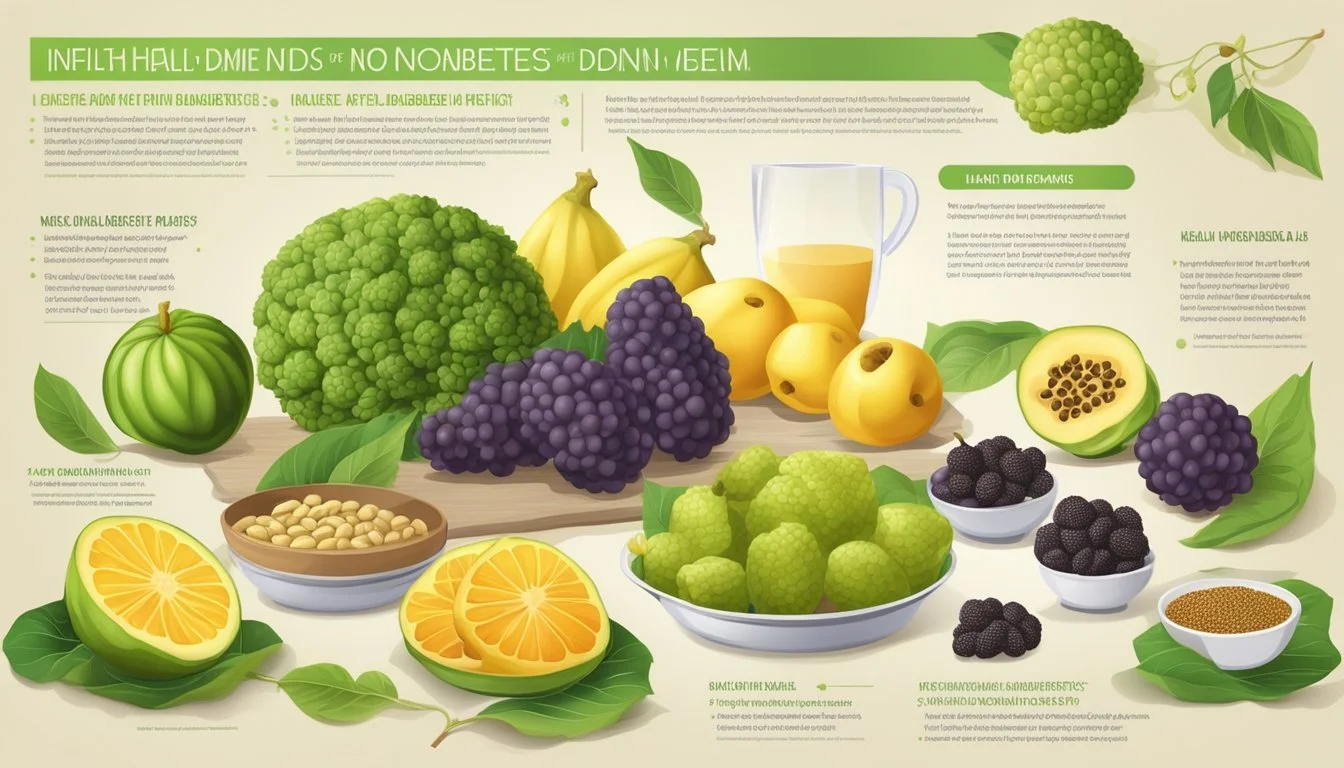Can Diabetics Eat Noni?
Understanding the Health Implications
Can diabetics eat noni? The answer lies in understanding its potential benefits and drawbacks. Noni, scientifically known as Morinda citrifolia, is a tropical fruit revered for its various health benefits. This unique fruit may offer promising advantages for diabetics, such as aiding in wound healing and potentially improving immune function.
However, caution is warranted. Noni juice often contains sugars that can elevate blood sugar levels, which is risky for diabetics. Studies have shown that consumption of noni juice could contribute to metabolic diseases if not consumed in moderation. Therefore, individuals with diabetes need to be mindful of their intake to avoid potential adverse effects.
In essence, while noni has potential health benefits for diabetics, it also carries risks that must be carefully managed.
What Is Noni?
Noni, scientifically known as Morinda citrifolia, is a fruit native to Southeast Asia, Polynesia, and India. It has been used for centuries in traditional medicine for its numerous health benefits.
Historical Use and Distribution
Noni, also referred to as Indian Mulberry or Beach Mulberry, has a long history in Polynesian medicine. Pacific Islanders have utilized its leaves, roots, bark, and fruits to treat various ailments.
The fruit has spread from its native regions to areas such as Australia and parts of the Caribbean, thanks to its wide range of perceived medicinal properties.
Nutritional Profile
The noni fruit is packed with essential nutrients. It contains protein, fiber, and a variety of vitamins and minerals. Among these, Vitamin C and Vitamin A are particularly notable.
Noni juice is a significant source of potassium, providing a substantial amount compared to other fruits. Here’s a brief overview of the nutritional content per 100 grams:
Nutrient Amount Calories 47 Protein 0.5g Carbohydrates 11g Fiber 3g Potassium 78mg Sodium 2mg
Active Bioactive Compounds
Noni is rich in bioactive compounds that contribute to its health benefits. These include antioxidants, which help to neutralize harmful free radicals in the body.
Flavonoids, triterpenes, and saponins are other notable compounds. Antioxidants present in noni juice can aid in reducing oxidative stress and inflammation.
These compounds are being studied for their potential benefits in boosting the immune system and even for anti-tumor properties.
Health Benefits of Noni
Noni is known for its broad range of health benefits, primarily due to its rich composition of bioactive compounds. These benefits include bolstering the immune system and alleviating chronic conditions such as heart disease and arthritis.
Immune System Support
Noni juice is packed with antioxidants, notably vitamin C. These antioxidants help combat oxidative stress, which can weaken the immune system. Vitamin C is essential for the proper functioning of immune cells, such as neutrophils and lymphocytes, which play a crucial role in fighting infections and pathogens.
Regular consumption of noni juice has been linked to improved overall immune response. By neutralizing free radicals, noni helps maintain cell integrity and supports minor wound healing.
Effects on Chronic Conditions
The anti-inflammatory properties of noni extend to various chronic conditions. Research indicates that noni juice can reduce inflammation markers, benefiting those with arthritis and similar inflammatory ailments.
Noni also contributes to better heart health by managing blood cholesterol levels and reducing high blood pressure. These factors lower the risk of heart disease and stroke. Additionally, studies suggest noni's potential in liver protection, making it beneficial for combating fatty liver disease.
Noni's compounds are being researched for their potential to inhibit cancer cell growth. While this is still under study, the initial findings are promising. Thus, noni might help in both the prevention and management of these chronic health issues.
Noni in Diabetic Diets
Noni juice has gained interest for its potential benefits in managing Type 2 diabetes. This has prompted research into its effects on blood sugar levels and its interactions with conventional diabetes medications.
Impact on Blood Sugar Levels
Studies have indicated that Noni juice may help in regulating blood sugar levels. For instance, research published in the "Nigerian Quarterly Journal of Hospital Medicine" found that rats given Noni juice alongside insulin had better blood glucose control.
Noni contains compounds that can aid in lowering elevated blood sugar, potentially making it a supportive dietary supplement for diabetics. Traditional uses by Pacific Islanders also point to its effectiveness in treating blood sugar-related issues.
Incorporating Noni into the diet could offer additional support beyond standard diabetes treatments. However, more clinical research is needed to confirm these benefits in humans.
Interactions With Medications
It's important for diabetics to consider Noni's interactions with medications. When combined with insulin, studies suggest enhanced effectiveness, but this interaction requires careful monitoring.
Noni juice may affect how other medications work. Those on ranitidine or other drugs for hypertension should consult healthcare providers before adding Noni to their regimen.
Considering these interactions is crucial for avoiding adverse effects and ensuring a safe integration into diabetes treatment plans.
Considerations for Diabetics Consuming Noni
When considering noni consumption, diabetics should look at potential risks and side effects, recommended consumption amounts, and the importance of consulting with a doctor.
Potential Risks and Side Effects
Noni juice has properties that may pose risks to diabetics. It can interact with medications, potentially causing adverse effects.
Key risks include:
Blood Sugar Levels: Noni juice may affect blood sugar control. Monitoring is crucial.
Liver Damage: Some cases suggest high doses could harm the liver.
High Blood Pressure: The potassium content may affect individuals with hypertension.
It is also important to be wary of added sugar in some noni products, which can impact blood glucose levels.
Recommended Consumption
Moderation is essential with noni juice.
Guidelines:
Serving Size: Typically, small amounts (e.g., 30-90 ml/day) are advised.
Calorie Restriction: Consider the calorie count if managing weight.
Juice Blend: Mixing noni juice with other juices may dilute its effects but watch for added sugars.
Following a clinical trial or clinical outcomes may offer more personalized recommendations.
Doctor Consultation
Before adding noni to their diet, diabetics should always consult their healthcare provider.
Key discussion points are:
Medication Interaction: Verify possible interactions with existing medications.
Clinical Trials: Ask about available data or personal experiences with noni.
Individual Health Needs: Discuss specific health concerns like blood pressure and systemic inflammation.
A doctor can provide guidelines based on individual health and current medical treatments.
Noni for Overall Well-being
Noni has been recognized not only for its potential effects on diabetes but also for its contributions to physical performance, mental health, and joint and bone health. This plant's abundance in bioactive compounds makes it a valuable addition for holistic well-being.
Enhancement of Physical Performance
Noni juice supports physical endurance and energy levels. By promoting efficient oxygen transport, it aids those engaging in regular exercise. Athletes and people who perform strenuous physical activity report improved endurance after incorporating noni into their diet.
Additionally, noni's natural compounds can help with weight loss, as they enhance metabolism and fat-burning processes. For individuals aiming to maintain a healthy weight, integrating noni can be beneficial. This makes it a versatile choice for enhancing general physical performance and energy balance.
Contribution to Mental Health
Noni has properties that can improve mood and reduce stress. The presence of compounds such as scopoletin may contribute to relaxation and mood improvement. This is valuable for anyone dealing with the pressures of daily life.
In addition, noni can support better sleep cycles, which in turn positively affects mental health. Regular consumption of noni may help reduce symptoms of anxiety and depression by promoting a feeling of well-being. For those seeking a natural way to enhance their mental resilience, noni offers a useful option.
Support for Joint and Bone Health
Noni contributes to joint health by reducing inflammation and increasing flexibility. It contains antioxidants that help to decrease inflammatory markers, making it practical for managing conditions like arthritis.
For bone health, noni's rich profile of nutrients supports bone density and strength. Its regular intake can help mitigate age-related bone loss, enhancing overall mobility. Individuals with joint pain or those at risk for osteoporosis might find incorporating noni into their diet advantageous for maintaining bone integrity.
Research and Studies
Investigations into the health benefits of noni have revealed its potential in helping manage diabetes, support cardiovascular health, and prevent cancer. These research findings highlight the therapeutic possibilities for individuals with diabetes.
Antidiabetic Effects of Noni
Studies indicate that noni can positively influence blood sugar levels and aid in diabetes management. Animal models show that fermented noni fruit juice helps to reduce blood glucose levels. This effect is attributed to compounds in noni that promote insulin secretion and improve insulin sensitivity.
Clinical trials have observed similar trends in human subjects. Regular consumption of noni juice demonstrated improvements in blood sugar control, potentially reducing dependence on conventional diabetic medications. Thus, noni shows promise for dietary inclusion in diabetes care.
Cardiovascular Benefits
Noni has displayed potential for improving cardiovascular health by impacting blood lipid profiles. Clinical studies reported that noni juice consumption led to reduced total cholesterol and improved HDL cholesterol levels. These changes can aid in managing dyslipidemia, a common comorbidity in diabetes.
Additionally, noni's antioxidant properties help combat cellular damage caused by free radicals. This reduces oxidative stress and inflammation, further promoting cardiovascular health. Such findings suggest noni as a candidate for supporting heart health in diabetics.
Cancer Prevention and Treatment
Research into noni's anticancer properties shows it may help prevent tumor growth and mitigate cellular damage. Data from various studies indicate that noni compounds can inhibit the proliferation of cancer cells and enhance the body’s ability to fight off free radicals.
By reducing oxidative stress, noni contributes to a lower risk of cancer development. Furthermore, some preliminary human trials suggest potential benefits in slowing cancer progression, positioning noni as a complementary option for cancer prevention and treatment.
Noni Consumption Advice
Noni, a fruit native to the Pacific Islands, offers potential blood sugar regulation benefits for diabetics. Selection, alternative products, and safety are key components to consider.
How to Select and Use Noni
When selecting noni products, look for commercial noni juices such as Tahitian noni juice. Ensure the product is pure and free from added sugars. Fresh noni fruit or dried fruit can also be consumed, though they may be less accessible.
Noni can be consumed in various forms:
Juice: Drinking noni juice in moderation can help control blood sugar levels.
Leaves and roots: Noni leaves and roots are sometimes used in traditional medicines.
Always consult a healthcare provider to tailor noni consumption to individual health needs.
Alternative Noni Products
Aside from juices and fresh fruit, noni is available in several other forms. Dried noni fruit can be a convenient option for those who cannot find fresh noni. Noni capsules or powders can be incorporated into daily routines more easily.
Capsules: Often used in complementary and alternative medicine.
Powders: Can be mixed into smoothies or other beverages.
These products should be selected based on nutritional content and be free from unnecessary additives. Reading labels carefully ensures quality and effectiveness.
Safety and Precautionary Measures
Safety is paramount when adding noni to a diabetic diet. There are potential contraindications:
Liver disease: Use noni with caution due to its impact on liver enzymes.
Pregnancy: Pregnant or breastfeeding women should avoid noni as safety data is limited.
Consult with healthcare providers to ensure noni does not interfere with other medications. Regular monitoring of blood sugar levels is essential to assess noni's impact. By taking these safety and precautionary measures, diabetics can safely explore the potential benefits of noni consumption.






